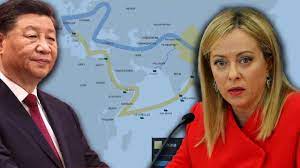Italy is about to say to Beijing, ‘Hit the road, Xi’

Rome: Rome’s anticipated departure from the Belt and Road Initiative likely marks the end of the project’s grand European aspirations, Elaine Dezenski writes.
In a surprising twist, Italy has indicated that it expects to leave China’s ambitious but troubled Belt and Road Initiative — a high-profile reminder that the initiative has failed to meet its goals.
For Rome, the promise of increased exports to China has not met expectations, while throughout the Global South, BRI agreements have often achieved little but funding corruption, building faulty or unneeded infrastructure, and contributing to a massive new debt burden for low-income countries already struggling to fund basic services.
Xi Jinping announced the massive Belt and Road Initiative in 2013 to much fanfare and self-congratulations.
Beijing saw the BRI as a new Silk Road that would reinforce China’s growing connection to countries in Asia, Africa, Latin America and, eventually, Europe.
Throughout the Global South, countries desperate for basic infrastructure clamoured to join the initiative, with more than 100 countries inking agreements with China over the first few years.
The high aspirations for the BRI, however, were soon handicapped by China’s own decisions to shroud deals in opacity, interfere in local politics, and prioritise quantity of projects over quality.
As the former president of China’s Export-Import Bank once explained, ‘We have a saying: If the water is too clear, you don’t catch any fish.’
The lack of transparency of BRI dealmaking was not an incidental side effect, but an intentional feature — designed to shield both China and local governments from critique.
As the former president of China’s Export-Import Bank once explained, “We have a saying: If the water is too clear, you don’t catch any fish.”
The opacity worked just as designed, allowing domestic governments to agree to outrageous terms or solicit bribes without any oversight — or awareness — from their own citizens.
Opaque negotiations and agreements, therefore, became cover for disadvantageous loans, massive corruption, and vanity projects that provided little value to citizens or economies.
China’s domestic electoral interference, such as funnelling BRI loan payments directly to the reelection coffers of corrupt Sri Lankan President Mahinda Rajapaksa, was the direct result, ironically, of China’s rhetoric of “non-interference” — a plan to offer loans with no-strings-attached.
Counter to most loans from Western lenders like the World Bank or the IMF, China eschewed conditions on the loans that would normally address risks of corruption, fraud, or inability to repay.
This no-strings mentality translated into a corruption free-for-all, where Chinese officials eager to close deals were more than willing to funnel bribes and kickbacks into the pockets of pro-China regimes.
More cost-effective choices were ignored to boost the value and prestige of projects, even if doing so meant that the projects could never break even.
Finally, China was so ready to close deals and promote the BRI, that it frequently failed to conduct basic cost-benefit analysis or disregarded analysis when it was done.
As a result, absurd, wasteful, and pointless projects proliferated — empty airports, railways that failed to reach their intended destination, and hydroelectric dams at the foot of active volcanos.
More cost-effective choices were ignored to boost the value and prestige of projects, even if doing so meant that the projects could never break even.
And the dam built at the foot of the volcano? Investigators have found more than 7500 cracks in its substandard steel.
With so many emerging economies now saddled with high levels of Chinese debt (60% of Chinese debt is held by countries in financial distress — a 1200% increase since 2010) and economically unproductive infrastructure failing to offer adequate returns, anti-China sentiment has increased across the Global South.
Some 62% of Brazilians and 56% of Indians, for instance, have unfavourable opinions of China, despite Brazil and India being core allies of China under the BRICS alliance.
Rather than being seen as the saviour of Africa and Latin America, China is increasingly seen as an imperialist force in its own right, forcing poor countries into financial contortions to deal with their high debt burden.
The newly minted ‘no-limits friendship’ between a belligerent Russia and an increasingly aggressive China has given democratic leaders further pause.
For the strong economies of Europe, the BRI’s initial appeal as a superhighway for global commerce has dimmed, as the reality of the BRI as a clumsy tool for geopolitical persuasion has scared off leaders from Greece to the Czech Republic.
The European Union has made clear that it regards China’s attempts at “systematic change of the international order” as a threat to Europe.
The newly minted “no-limits friendship” between a belligerent Russia and an increasingly aggressive China has given democratic leaders further pause.
Vladimir Putin’s decision to attend the upcoming BRI Summit is almost certain to convince most European leaders to stay home.
Nowhere is the about-face on receptivity to Chinese investment more stark than in Italy, which in 2019 became the only G7 country to sign on to the BRI amid high hopes for boosting Italian exports.
In reality, Italy’s trade deficit with China has increased since 2019. Italian Prime Minister Georgia Meloni has since called Italy’s involvement with the BRI a “big mistake”.
As Italian Defence Minister Guido Crosetto put it, ‘we just exported some oranges,’ while Chinese exports to Italy grew by more than 50% since the BRI agreement was signed.
And while Italy is likely to maintain significant trade ties with China, the BRI has offered little tangible benefit to Italy.
As Italian Defence Minister Guido Crosetto put it, “we just exported some oranges,” while Chinese exports to Italy grew by more than 50% since the BRI agreement was signed.
Italy’s reversal exposes the fallacy that the BRI might lead to more favourable trade balances with Beijing.
Italy’s anticipated departure from the BRI likely marks the end of the project’s grand European aspirations.
The BRI will not close any time soon, but China has massively reduced its overseas lending, and diverse countries, such as Malaysia, Pakistan, Sierra Leone, Myanmar, and Bangladesh, have had second thoughts, cancelling substantial BRI projects.
From this point on, the BRI is likely to function mostly as a means for debt-strapped countries and vassal states in China’s orbit to access high-interest financing.

